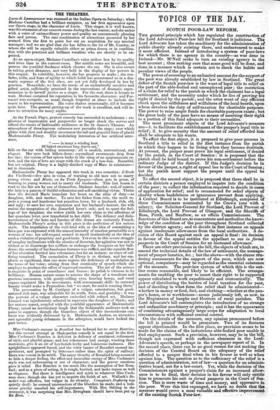TOPICS OF THE DAY.
SCOTCH POOR-LAW REFORM.
THE general principle which has regulated the constructioik of the Lord Advocate's ]Poor-law bill for Scotland isjudicious. The Lord Advocate has taken the machinery for the administration of public charity already existing there, and endeavoured to make it more efficient. Instead of introducing a system of poor-lavis for which there is no agency in the country—as was done in Ireland—Mr. M'Neil seeks to turn an existing agency to the best account ; thus making sure that some good will be done, and done in a manner which is certain not to shock the habit; and peculiar views of the people.
The power of assessing to an unlimited amount for the support of the poor was already established by law in Scotland. The great defect of the Scotch poor-law is the want of legal title to relief on the part of the able-bodied and unemployed poor ; the restriction of a claim for relief to the parish in which the claimant has a legal settlement, and the necessity under which he lies of proving his right if denied by the parish ; and the utter want of any efficient check upon the selfishness and wilfulness of the local boards, upon whom devolves the duty of self-taxation for charitable purposes. The power to raise ample funds for charitable purposes exists ; but the great body of the poor have no means of asserting their right to a portion of this fund adequate to their necessities.
The most prominent objects of the Lord Advocate's measure are-1. to facilitate the establishment of the pauper's legal title to relief; 2. to give security that the amount of relief afforded him shall be adequate to his wants. To effect the first object, it is proposed to give poor persons in Scotland a title to relief in the first instance from the parish in which they happen to be living when they become destitute. At present, the .pauper must prove his legal settlement, if denied by the parish, in the Court of Session : it is proposed that the parish shall be held bound to prove his non-settlement before the ordinary Judge of the district. If this Judge's decision be in favour of the pauper, a right of appeal lies to the Court of Session; but the parish must support the pauper until the appeal be decided.
To effect the second object, it is proposed that there shall be in certain districts a person employed to inquire into the condition of thepoor ; to collect the information required to decide in cases of application for relief; and to recommend for relief objects of charity whom bashfulness or ignorance prevent from applying. A Central Board is to be instituted at Edinburgh, composed of three Commissioners nominated by the Crown (one with a salary); the Solicitor-General for Scotland, the Lord Provost of Edinburgh, the Lord Provost of Glasgow, and the Sheri& of Ross, Perth, and Renfrew, as ex officio Commissioners. The functions of this Board are, to concentrate and methodize the know- ledge of the condition of the poor throughout Scotland collected by the district agents ; and to decide in first instance on appeals against inadequate allowances from the local authorities. A de- cision of this Board against such an appeal is final : its decision in favour of the appeal entitles the appellant to sue in larva pauper's in the Court of Session for an increased allowance. There are other provisions in the bill, the objects of which are, to amend the technical details of the law of settlement, the manage- ment of pauper lunatics, &c. ; but the above—with the clause ren- dering assessments for the support of the poor, which are now optional, compulsory—may be regarded as the essential substance of the measure. The poor-law system of which this is the out- line seems reasonable, and likely to be efficient. The arrange. ments for enabling the poor to assert their right to be supported appear calculated to work expeditiously and economically. The power of distributing the burden of local taxation for the poor, and of deciding in what form the relief shall be administered— whether in money or food, fuel, and clothing—whether at the pau- per's home, or in workhouses—seems judiciously left, as now to the Magistrates of burghs and Heritors of rural parishes. now, Lord Advocate's bill contemplates the introduction of no strange and unfamiliar machinery or principle ; and it has the appearance of combining advantageously large scope for adaptation to loeal circumstances with sufficient central control.
On the details of the measure, any opinion pronounced before the bill is printed would be premature. Two of its features appear objectionable. In the first place, no provision seems to be made for the claims of the industrious able-bodied poor unable to find employment. Such a provision, however, may be in the bill, though not expressed with sufficient clearness in the Lord- Advocate's speech, or perhaps in the newspaper report of it. In the second nlace, there can be no good reason for not making the decision of_ theCentral Board on the adequacy of the relief afforded to a pauper final when in his favour as well as when against him. The question as to the sufficiency of the relief is a question of administration, not of law—a question for an adminis- trative board, not for a law-court. Yet, while the decision of the Commissioners against a pauper's claim for an increased allow- ance is to be final, their decision in his favour will only entitle him to prosecute his suit in forind pauper's in the Court of Ses- sion. This is mere waste of time and money, and oppressive to the poor. Were this blot expunged, we have no don t that gm measure would prove a most valuable and effective improvement of the existing Scotch Poor-law.


























 Previous page
Previous page